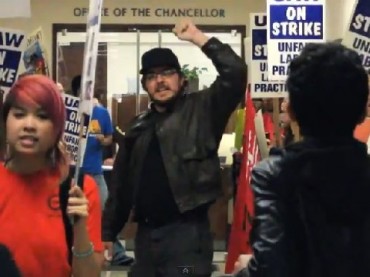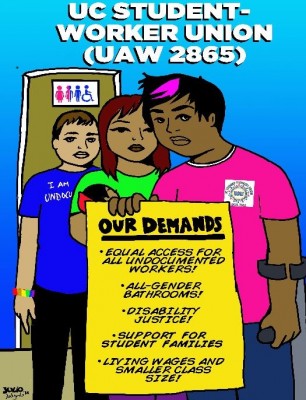
The University of California system’s United Student-Workers Union organized a strike on the UCLA campus last week, and it was a spectacle to behold.
The strikers, totaling in the hundreds, gathered in front of Powell Library on Thursday morning and proceeded to march around campus throughout the day, playing music, banging on drums, and shouting in unison.
Many of my friends had discussion sections canceled because their TA’s decided to get in on the action, as the UAW purports to represent “over 13,000 Teaching Assistants, Graduate Student Instructors, Readers and Tutors at the University of California,” according to its website.
I wanted to get in on the action, too, so I went down to the strike area to see what all the fuss was about.
When I first got there I was surprised at the strikers’ collective chutzpa. Many an exuberant face stomped by me vigorously brandishing the UAW demand sign. Notorious B.I.G. bumped in the background as one of the leaders kept calling for his strikers not to back down in their incessant inveighing.
Many protestors wore shirts with the UAW slogan, “educate, agitate, organize,” and logo, a muscular fist clenching a pencil (a literate iron fist, if you will).
The UAW has a specific list of demands that it presented to the UCLA and larger UC administrations and whoever was willing to listen.
The standard UAW sign many were wielding demanded:
· Equal access for all undocumented workers
· All-gender bathrooms
· Disability justice
· Support for student families
· Living wages and smaller class sizes
The apparent disjunction in and somewhat desultory nature of these demands notwithstanding, the majority of strikers, being graduate students and teaching assistants, were primarily concerned with large undergraduate class sizes and low pay.
One sign posted on the wall related the challenging situation one teaching assistant had found himself in: “I had a class of 93 students and had to grade 650 short essays with 7 questions each for the final.”
Another sign lamented the fact that grad students would eventually have to pay back their loans: “Government will garnish your wages if you don’t pay your student loans.”
One sign seemed to key in on the fact that the supply of PhDs in majors like sociology and history far outstrips the number of jobs that demand such training: “Because you pay a professional fee with no promise of a profession.”
Finally, a flyer “protested” the dizzying rate at which tuition has climbed over the last twenty years: from $2,761 in 1994 to $11,220 in 2014.
Other flyers had a more populist and classist flavor: one decried UC President Janet Napolitano’s $577,000 salary and $8,916 stipend for her car, and another lambasted some UC coaches’ $2 million salaries.
Of course, fringe-type characters came out of the woodworks to join the more focused protestors.
One pair of people handed me a flyer about “The Communist Revolution and the REAL Path to Emancipation.” The flyer invited me to a presentation to listen to some speaker enlighten me about communism because “the whole history of communism in the 20th century shows that IT IS possible to create a society and world in which humanity can truly being to flourish.” Where do I sign up?
I talked to one fellow who was particularly irked by the “disenfranchisement” of Central Americans in California. I pressed him a little bit as to what he meant by “disenfranchisement.” He told me of the Central Americans’ plight: they feel they don’t have a voice or “visibility” because there aren’t that many of them on talk shows and in the American media and also because there aren’t very many people teaching classes specifically about Central Americans in college these days. He pointed out the injustice in having so many classes about Mexican-Americans at UCLA, but only one about Central Americans.
Many people were holding homemade signs instead of the template UAW sign. My personal favorite was one girl’s sign, which simply read: “Labor is Unfair.” If I had more time I surely would have delighted in learning more about the ethos behind such a simple, yet elegant, phrase.
All in all, the UAW strike was a pretty typical strike. The overall milieu of the scene was eclectic: there were the commies as well as the people who just came out for the free sandwiches and an occasion to yell, but the majority of the strikers were genuinely peeved and seemed pretty sensible insofar as their central demands were fairly focused and consistent.
They actually honed in on some important points: grad students are taking on quite a bit of debt with little hope of securing a good job to pay off said debt, tuition has risen dramatically over the last twenty years, and college administrators are splurging at the expense of undergraduate class sizes (they didn’t need to tell me twice about that).
However, I didn’t see on the national news any grad students’ unions protesting in Washington D.C. against the Direct Unsubsidized and PLUS federal loan programs which have subsidized the grad student bubble (as I call it) and have ensured a steady, government-backed cash flow that has led directly to the tuition hikes and to college administrators spending on lavish new campus restaurants and administrators’ salaries.
Ah, perhaps if there were more economics students involved in these protests—I guess that would be wishful thinking.
Wait, let me rephrase: perhaps if there were more economics students involved who are not being educated by liberal economics professors. Wishful thinking indeed.
College Fix contributor Josh Hedtke is a student at UCLA.
Like The College Fix on Facebook / Follow us on Twitter
IMAGE: Main – YouTube screenshot; Inside: United Student-Workers Union screenshot





Please join the conversation about our stories on Facebook, Twitter, Instagram, Reddit, MeWe, Rumble, Gab, Minds and Gettr.